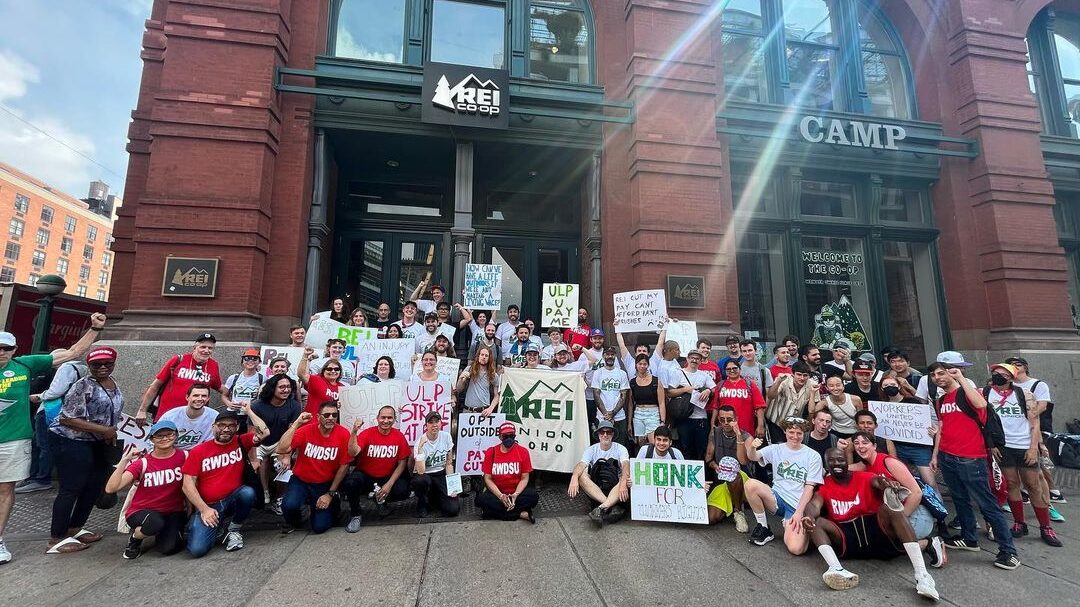REI, the outdoor equipment company, has long touted its progressive ideals. In fact, many employees said they were drawn to the company’s progressive reputation as a member-owned cooperative – “Putting purpose before profits,” as the company puts it. When employees at the company’s Soho store felt the company had skewed from those values during the Covid-19 pandemic, workers responded in a way that reflected those progressive ideals: they unionized.
“I want to make sure that REI’s image reflects the type of company that it actually is,” said Graham Gale, 25, an employee at the outdoor equipment and clothing retailer for nearly four years.
At least 10 other REI locations followed suit and began to organize, but the company’s response did not align with their supposed ideals, workers said. In fact, the story of progressive companies turning on their workers when they try to organize has become commonplace. Meanwhile, America’s biggest companies – like Amazon, Starbucks, UPS, and General Motors – are also facing union strikes for poor treatment and worse wages. Actors, nurses, baristas, delivery drivers, and teachers have also unionized in recent years for better pay and fair treatment. This rise in labor organizing has been dubbed the “Hot Labor Summer.” And some workers say it has revealed the true face of their supposedly progressive companies.
“The type of company that [REI] actually is, is just like any other company – like a Target, an Amazon, a Walmart,” Gale said.

At the REI location in Soho where Gale works, workers voted 88-14 in favor of unionizing on March 2, 2022 – the first time an REI location unionized. They primarily cite health and safety concerns on the heels of the COVID omicron variant. During the following summer in June 2023, the SoHo union’s contract with REI expired. This year-long contract had guaranteed employees the same wages as other locations — solely on the condition that they would withhold their right to strike. The afternoon the contract expired, their wages were once again cut. In response, the union held its second walkout to protest for fair treatment and wages on September 9.
When filing for union representation, about 120 REI employees cited that the company’s blatant disregard for COVID-era health policies was part of a serious problem occurring on a national level. Incidents cited included the reopening of dressing rooms despite employees’ vocal concerns, unresponsive management, and unsatisfactory wages and benefits in the wake of the pandemic. REI had been deemed an essential store due to its bike shop, which was crucial for delivery service, and therefore stayed open indefinitely throughout the majority of quarantine and onward. The National Labor Relations Board is currently reviewing over 20 claims of unfair labor practices against REI, according to NPR.
Despite REI’s supposed squeaky-clean, progressive image and superb optics, what they do behind closed doors is often something the public is not privy to. “REI has done a really good job at painting themselves to appear as a progressive company,” Gale said. “But if you can’t transfer that same generosity, care, and concern for people’s well-being to your workers, then all of that behavior is meaningless.”
Progressively branded companies have been criticized for marketing tactics like greenwashing, where they intentionally market an inclusive, environmentally friendly image to bolster sales. However, companies like REI have struggled to maintain this image in the face of labor disputes.

Clare Chang, who has been with REI for six years as a visuals employee, was disappointed but not surprised by REI’s responses to the unionization.
“We voted in the union last year, and every step of the way, despite REIs’ progressive public image, they fought us. So the union-busting has been relentless,” Chang said.
As the first location to unionize, Chang said the stakes are a bit higher: “It puts us in a position where we could have some gains and improve things. I think REI and our interests are basically, diametrically opposed right now.”
The labor movement has gained quite a bit of momentum in the last several years, particularly among younger people. A poll from the American Federation of Labor found that 90% of people under 30 approve of strikes, and 88% approve of labor unions. It is then no coincidence that the the U.S. Bureau of Labor Statistics reported that the US is currently in the biggest strike movement since the 80s. Young people are fed up all over the country; their motto being “Don’t quit, organize,” Gale said.
Chang said,“Having to just jump to another job and experience similar systems, when is it going to stop? Are you going to just job-hop forever? We live in a capitalist society, these things are built up, it’s all top-down. Even if a company starts great, which REI did. …Anytime a corporation needs to make cuts, the people at the bottom get it worst. So why not stay and make it a better place?”
Ultimately, Gale remains rooted in the union’s motives and purpose: “It’s not like we are instigating a strike for no reason right now. [It’s] management [that] has pushed us to this point. They have confronted us so many times that we are left with no other option but to withhold our labor.”
The Free Press reached out to REI for comment on the strike. The company replied with the following statement: “REI has tried repeatedly to engage the RWDSU to extend this “side letter agreement” since April 2023. The RWDSU would not agree to an extension of the side letter agreement, which means that as of the letter’s June 1 expiration date, employees will no longer enjoy the temporary pay raises that they experienced during the terms of the agreement. It has always been clear and understood between REI and the RWDSU/employee bargaining committee that these pay raises were temporary for the duration of the agreement. REI is committed to continuing to bargain in good faith with the RWDSU and our employees in the SoHo store.”








Leave a Reply